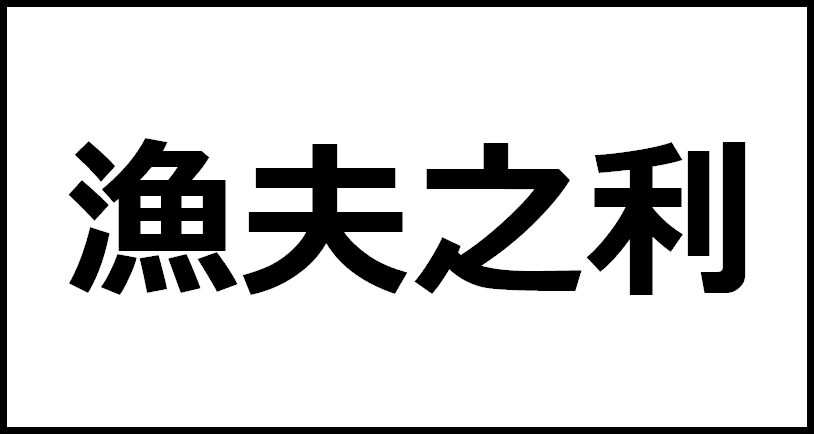漁夫之利について。四字熟語の漁夫之利の読み方や意味、英語や外国語での意味をまとめました。
漁夫之利について
漁夫之利の読み方・意味
| 四字熟語 | 漁夫之利 |
| 読み方 | ぎょふのり |
| カタカナ読み | ギョフノリ |
| ローマ字読み | gyofunori |
| 読みの文字数 | 5文字読みの四字熟語 |
| 頭文字 | 「ぎ」から始まる四字熟語 |
| 構成する文字 | ・之 ・利 ・夫 ・漁 |
| 意味 | 二者が争っている間に、無関係な者が苦労することなく利益を得ること。趙が燕を攻めようとしたときに、燕の遊説家の蘇代が趙の恵文王の元に出向いて「鷸(シギ)と蚌(ハマグリ)が争っている間にどちらも漁師に捕まえられてしまった」というたとえ話をした後に「趙と燕が争えば、弱ったところを秦に狙われて両国とも取られてしまうだろう」と言って恵文王を説得したという故事から。漁父之利とも書く。 |
漁夫之利の意味(外国語)
漁夫之利の外国語での意味をまとめました。
| 英語 | An unrelated party gaining an advantage without difficulty while two parties are fighting. When Zhao was about to attack Yan, Su Dai, a Yan campaigner, went to King Huiwen of Zhao and said, “While the snipe and the clam were fighting, they were both caught by fishermen. It is based on the historical story that he persuaded King Huiwen by saying, “If Zhao and Yan fight, Qin will target their weakness and take both of them.” It is also written as fishing father’s profit. |
| スペイン語 | Una parte no relacionada que obtiene una ventaja sin dificultad mientras dos partes están peleando. Cuando Zhao estaba a punto de atacar a Yan, Su Dai, un activista de Yan, fue al rey Huiwen de Zhao y le dijo: “Mientras la agachadiza y la almeja peleaban, ambos fueron atrapados por pescadores. Se basa en la historia histórica que persuadió al rey Huiwen diciendo: “Si Zhao y Yan pelean, Qin apuntará a su debilidad y los tomará a ambos”. También se escribe como ganancia del padre pescador. |
| イタリア語 | Una parte non correlata ottiene un vantaggio senza difficoltà mentre due parti stanno litigando. Quando Zhao stava per attaccare Yan, Su Dai, un attivista Yan, andò dal re Huiwen di Zhao e disse: “Mentre il beccaccino e la vongola stavano combattendo, furono entrambi catturati dai pescatori. Si basa sulla storia storica che persuase il re Huiwen dicendo: “Se Zhao e Yan combattono, Qin prenderà di mira la loro debolezza e li prenderà entrambi”. È anche scritto come profitto del padre pescatore. |
| ポルトガル語 | Uma parte não relacionada ganhando vantagem sem dificuldade enquanto duas partes estão lutando. Quando Zhao estava prestes a atacar Yan, Su Dai, um ativista de Yan, foi até o rei Huiwen de Zhao e disse: “Enquanto a narceja e o molusco lutavam, ambos foram capturados por pescadores. É baseado na história histórica que ele persuadiu o rei Huiwen dizendo, “ Se Zhao e Yan lutarem, Qin irá atacar a fraqueza deles e tomar os dois.” Também está escrito como lucro do pai pescador. |
| フランス語 | Une partie non apparentée qui obtient un avantage sans difficulté alors que deux parties se battent. Lorsque Zhao était sur le point d’attaquer Yan, Su Dai, un militant de Yan, est allé voir le roi Huiwen de Zhao et a dit: “Pendant que la bécassine et la palourde se battaient, ils ont tous deux été attrapés par des pêcheurs. C’est basé sur l’histoire historique que il a persuadé le roi Huiwen en disant: “Si Zhao et Yan se battent, Qin ciblera leur faiblesse et les prendra tous les deux.” Il est également écrit comme profit du père pêcheur. |
| 中国語 | 两党相争,一无关联的一方轻而易举地占了便宜。 赵国将攻燕,燕将苏代去见赵惠文王说:“鹬蚌相争,皆为渔夫所擒。”他劝说惠文王说:“若赵、燕相争,秦必取其弱。” 又写为渔父之利。 |
| 韓国語 | 두 사람이 싸우는 동안 무관한 사람이 고생하지 않고 이익을 얻는 것. 조가 삼위를 공격하려고 할 때, 삼기의 유설가의 소요가 조의 에몬 왕의 곁을 향해 ‘독(시기)과 모기(ハマグリ)가 싸우고 있는 동안 어느 쪽도 어부에게 잡히게 된다. 버렸다”는 비유를 한 뒤에 “조와 삼기가 싸우면 약한 곳을 진에 노려져 양국 모두 취해 버릴 것이다”라고 말해 에분왕을 설득했다는 고사에서. 어부 노리라고도 쓴다. |


